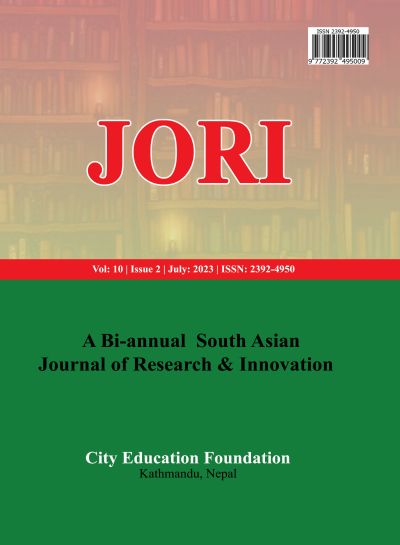Healthcare Waste Management Practices in Selected Healthcare Institutions within Kailali District of Nepal
DOI:
https://doi.org/10.3126/jori.v10i2.71820Keywords:
healthcare waste management, healthcare facilities, waste segregation, waste disposalAbstract
Background and Objectives: Proper healthcare waste management (HCWM) is crucial for preventing public health risks and environmental contamination. While HCWM has received more focus in recent years, developing countries like Nepal still face challenges in its implementation. This study aimed to evaluate HCWM practices in the healthcare institutions in the Kailali district of Nepal, Including both hospitals and health posts.
Materials and Methods: A cross-sectional study design was employed to provide a comprehensive understanding of HCWM practices. Semi-structured interviews were implemented to gather data from individuals responsible for HCWM in each of the selected healthcare facilities (HFs), supplemented by on-site observations. Ethical clearance was obtained from Nepal Health Research Council and ethical standards were followed.
Results: The amount of waste generated by the HFs ranged from 1 kg to over 50 kg daily with an average of 10 kg per day. The majority of the facilities (80%) segregated waste at the point of generation, and labelling was used in segregation containers in 80% of the facilities. Most facilities (80%) used plastic bins for waste collection, and the frequency of waste collection varied, with 30% of facilities collecting waste three times a day, 30% collecting according to waste quantity, 30% collecting once a day, and 10% collecting twice a day. All facilities had good lighting, ventilation, drainage, water supply, and needle-proof containers in their waste storage areas. The duration of waste storage varied, with 40% of facilities storing waste for six hours, 20% for 72 hours, 20% for 168 hours, 10% for 12 hours, and 10% for 96 hours. Nine out of the ten facilities (90%) practiced some form of waste treatment before disposal. The most common methods were chemical disinfection (70%), burial (60%), and burning (50%). Conclusion: This study revealed significant variations in HCWM practices across the different healthcare facilities in Nepal, highlighting the need for context-specific strategies. The findings underscore the importance of standardized HCWM protocols tailored to individual health facility needs, comprehensive staff training, and investment in adequate infrastructure and availability of resources to ensure safe and effective HCWM. By addressing these key areas, healthcare facilities in Nepal and similar settings can minimize public health risks and environmental pollution.




